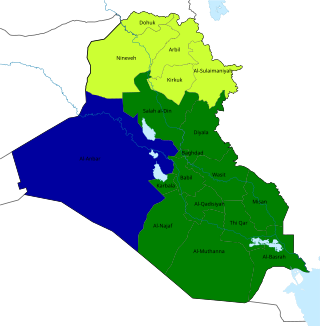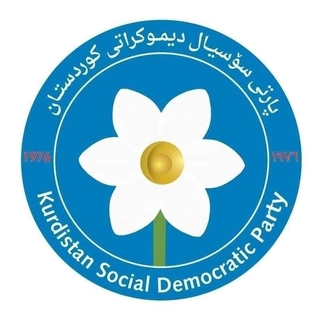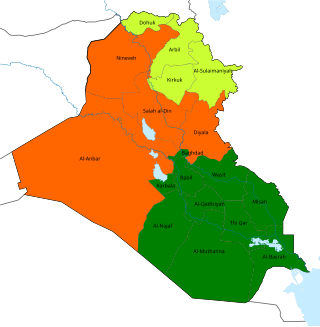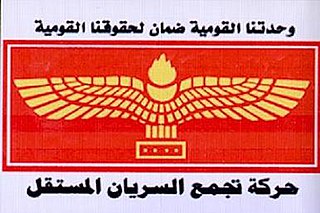Related Research Articles
Iraq is a federal parliamentary representative democratic republic. It is a multi-party system whereby the executive power is exercised by the Prime Minister of the Council of Ministers as the head of government, the President of Iraq as the head of state, and legislative power is vested in the Council of Representatives.

The Patriotic Union of Kurdistan is a political party active in Kurdistan Region and the disputed territories in Iraq. The PUK describes its goals as self-determination, human rights, democracy and peace for the Kurdish people of Kurdistan and Iraq. The PUK is currently under the leadership of Bafel Talabani. The PUK was founded in 1975 by Jalal Talabani, Nawshirwan Mustafa, Fuad Masum, Adel Murad, Ali Askari and Abdul Razaq Feyli Dawood Mohammed Ali. All presidents of Iraq under the 2005 constitution have been from this party.
Mahmoud Ali Othman was a member of the Interim Iraq Governing Council created following the United States's 2003 invasion of Iraq. A Kurd and Sunni Muslim, Othman was a member of the Political Bureau Kurdistan Democratic Party (KDP). He then founded the Kurdish Socialist Party. He was also the Chief Negotiator in the 1970 agreement with the Baath Party. He is now a leading member of the Iraqi National Assembly.

Barham Salih is an Iraqi Kurdish politician who served as the eighth president of Iraq from 2018 to 2022.

Parliamentary elections were held in Iraq on 30 January 2005 to elect the new National Assembly, alongside governorate elections and a parliamentary election in Kurdistan Region. The 275-member legislature had been created under the Transitional Law during the international occupation. The newly elected body was given a mandate to write a new constitution and exercise legislative functions until the new constitution came into effect. The elections also led to the formation of the Iraqi Transitional Government.

The Kurdistan Social Democratic Party is a political party in Kurdistan Region. It was founded as Kurdistan Socialist Party - Iraq. The first leader was Saleh Yousefi after 1981.
Kurdistan Islamic Union, colloquially referred to as Yekgirtû, is a Kurdish Islamist party in Iraqi Kurdistan.

Parliamentary elections were held in Iraq on 15 December 2005, following the approval of a new constitution in a referendum on 15 October.

The Bet-Nahrain Democratic Party, usually abbreviated as BNDP, is an Assyrian political party based in Iraq. For much of it's lifespan and involvement in politics, the party has been lead by Romeo Hakkari. One of the party's goals was to create an autonomous Assyrian administrative region within the Assyrian homeland, through the framework of the Iraqi constitution.
The Chaldean Democratic Party, also known as the Chaldean Democratic Union or the Chaldean Democratic Union Party, is an Assyrian Christian democrat political party from Iraq and within the autonomous Kurdish region. The political party was primarily geared towards and aimed to represent Chaldean Catholic Assyrians.

The Kurdistan Regional Parliament, also known as Kurdistan Parliament - Iraq, or simply Perleman, is the parliament of the Kurdistan Region in Iraq. It is made up of representatives from the various parties, lists or slates that are elected every four years by the inhabitants of Kurdistan Region, which is currently governed by the Kurdistan Regional Government. In 2009 an amendment was applied to the Kurdistan Election Law of the year 1992, changing the name of the body to Kurdish Parliament from its previous name: the Kurdish National Assembly.

The Iraqi Kurdish Civil War was a civil war that took place between rival Kurdish factions in Iraqi Kurdistan during the mid-1990s, mostly between the Patriotic Union of Kurdistan and the Kurdistan Democratic Party. Over the course of the conflict, Kurdish factions from Iran and Turkey, as well as Iranian, Iraqi and Turkish forces, were drawn into the fighting, with additional involvement from American forces. Between 35,000 and 40,000 fighters and civilians were killed.

Assyrian politics in Iraq have been taking many different turns since the US invasion of the country in 2003. Today, there are many different Assyrian political parties in Iraq. The main Assyrian party that came out from the 2005 elections was the Assyrian Democratic Movement. However, Sarkis Aghajan began to challenge its power beginning in 2006 with the opening of Ishtar TV and the KDP-affiliated Chaldean Syriac Assyrian Popular Council.

The Kurdistan Region parliamentary elections of 2009 took place on 25 July 2009. A total of 2.5 million citizens of Kurdistan Region were eligible to vote for the parliamentary and presidential elections. People currently living outside Kurdistan Region were not allowed to vote. The elections followed the 2005 Kurdistan Region parliamentary election. The parliamentary elections coincided with the direct election of the President of Kurdistan. Unlike the parliamentary elections in 2005, the president of Kurdistan was to be chosen directly through popular votes. A referendum to approve the constitution of Kurdistan Region originally planned for the same day was put back to 1 August.

The Kurdistan List, also known as the Kurdistan Alliance or the Brotherhood List, is the name of the electoral coalition that ran in the Kurdistan Regional Government parliamentary elections in Iraqi Kurdistan in July 2009. The Kurdistan List represented a coalition of the two main ruling parties in Iraqi Kurdistan, namely the Kurdistan Democratic Party and the Patriotic Union of Kurdistan. It is the successor of the Democratic Patriotic Alliance of Kurdistan.

The Syriac Assembly Movement, formerly known as the Syriac Independent Gathering Movement, is an Assyrian political party from Iraq. The party's membership comprised mostly Assyrian Christians, particularly those who belonged to the Syriac Catholic community, and to a lesser extent those of the Syriac Orthodox Church.

Parliamentary elections were held in the Kurdistan Region of Iraq on 21 September 2013. They were the fourth parliamentary elections in Kurdistan Region since 1992. The candidates were competing for a total of 111 seats out of which 11 seats were reserved for minorities. According to the Iraqi High Electoral Commission, there were 366 female and 736 male candidates for the elections. A total of 2,653,743 people were eligible to vote throughout the three provinces of Erbil, Sulaymaniyah and Dohuk of which 74% cast their ballots.

Parliamentary elections took place in Kurdistan Region on 30 September 2018 to elect Parliament. The election came a year after a failed bid for independence and left the ruling Kurdistan Democratic Party (KDP) with 45 seats, that positioning it to lead the next regional government. Announcement of the results was delayed for three weeks. The KDP's historic rival and junior coalition partner in government, the Patriotic Union of Kurdistan (PUK), was in second place with 21 seats. The results suggest that Masoud Barzani’s KDP will take a dominant position in Kurdish politics.

The first Rojava regional elections were held on 1 December 2017. Local councils for the Jazira Region, Euphrates Region and Afrin Region were elected as well as for the subordinate cantons, areas and districts of the regions of Rojava. This followed the communal elections that were held on 22 September and was to be followed by a federal parliamentary election of the Syrian Democratic Council, the region's highest governing body, initially scheduled for January 2018, but was later postponed.
The Kurdistani Coalition or Kurdistan Alliance Party is an electoral coalition founded by the major Kurdish parties of Kurdistan Region to run in the next Iraqi governorate elections. The coalition will run in the disputed areas between Iraq and Kurdistan Region and Baghdad Governorate to consolidate Kurdish votes. A total of 96 candidates will run as part of the coalition.
References
- ↑ Lansford, Tom (2021-05-31). Political Handbook of the World 2020-2021. CQ Press. p. 1984. ISBN 978-1-5443-8473-3.
- ↑ Phillips, David L. (2018-11-29). The Great Betrayal: How America Abandoned the Kurds and Lost the Middle East. Bloomsbury Publishing. p. 69. ISBN 978-1-78673-576-8.
Further reading
- "Kurdistan Alliance Election Poster" (PDF). Archived from the original (PDF) on 2016-03-11.